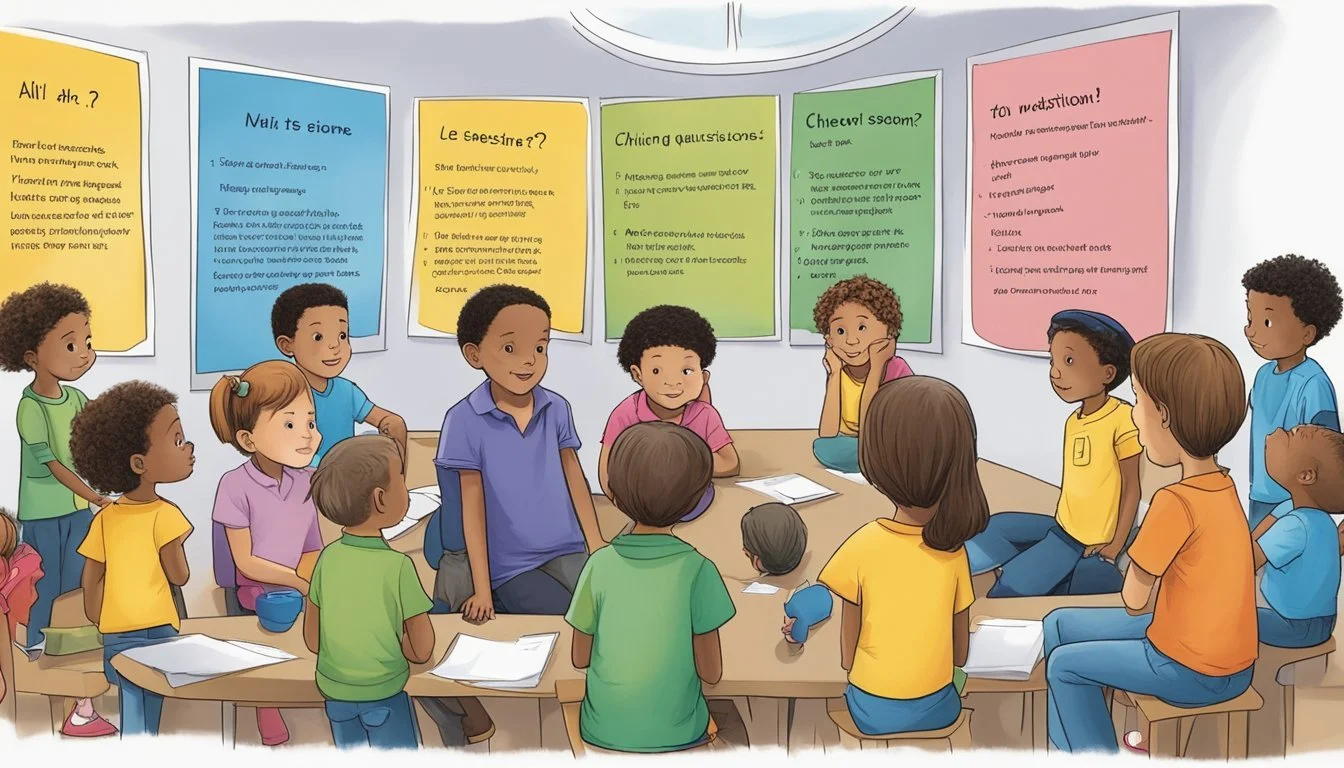16 Questions to Ask Before Considering a Breakup with Children Involved
Essential Guidance for Parents
Navigating a breakup can be especially challenging when children are involved. Emotionally charged decisions often need careful consideration, particularly in how they will impact the kids' well-being and stability. Understanding the importance of asking the right questions can help parents manage this difficult transition more effectively.
Asking the right questions before deciding to end a relationship helps ensure that the needs of all family members are addressed. This thoughtful approach can provide clarity and reassurance, easing the pain and confusion that often accompany such life-changing decisions. Whether it's discussing future co-parenting arrangements or evaluating personal reasons, these questions serve as an essential guide.
1) Have we tried counseling as a family?
Family counseling can offer valuable tools and perspectives for managing conflicts and improving communication. It's a structured setting where each family member can express their feelings and concerns in a safe environment.
When children are involved, family therapy helps them understand the situation better, reducing feelings of confusion or anxiety. A therapist can provide strategies tailored to each family's unique dynamic.
Before considering a breakup, it's crucial to explore whether family counseling could address unresolved issues. This step shows a commitment to working through challenges together. Many parents report improved relationships and a more cohesive family unit after undergoing therapy.
If reluctance or resistance is a factor, especially from children, explain the benefits clearly. Children might be hesitant initially, but understanding that the goal is to make the family stronger can ease their concerns.
For helpful guidance on preparing children for therapy, refer to advice on Sherman Counseling. Parents should also feel empowered to ask questions and seek support, as noted by Concord Family Counseling.
Family therapy should be a serious consideration in any decision-making process regarding a breakup. It offers a constructive path to potentially resolve deep-seated issues for the benefit of everyone involved.
2) How will we explain our decision to the children?
When discussing a breakup with children, clarity and honesty are crucial. Parents should prepare to explain the situation in an age-appropriate manner, ensuring the children understand that they are not to blame.
Both parents should ideally be present to convey the decision together. This united front can help provide a sense of stability and reduce the children’s anxiety.
It’s important to use simple language, avoiding complex terms that might confuse them. Phrases like “mom and dad have decided to live in different houses” can be clearer for younger kids.
Allow the children to express their emotions and ask questions. Acknowledge their feelings, whether they are sad, angry, or confused. This validation can help them process the situation.
Parents should reassure the children that both parents will continue to love and care for them. Emphasizing that their well-being is a top priority helps to provide comfort during the transition.
Continuing routines as much as possible can provide a sense of normalcy. Reinforce that, despite the changes, many aspects of their daily lives will remain the same.
Link to additional help or resources, such as books or counseling, to support the children in understanding and coping with the breakup.
3) What arrangements have we made for co-parenting?
Effective co-parenting arrangements require clear and agreed-upon strategies. Both parents should establish consistent guidelines for communication. Frequent and documented communication is essential to prevent misunderstandings and keep both parties informed.
Legal and physical custody terms need to be thoroughly discussed. Decisions regarding who will hold primary custody and how visitation schedules will be arranged should be finalized. This ensures that the child has a stable environment.
Another critical aspect is financial responsibility. Both parents should agree on how they will share costs related to the child's upbringing. This includes everyday expenses, education, healthcare, and extracurricular activities.
Parents should also agree on key parenting decisions. Decisions about the child's education, healthcare, and general well-being require mutual consent. Having a plan for conflict resolution can help address disputes that may arise.
Consideration of the child’s well-being is paramount. Arrangements should include discussions about the child's emotional and psychological needs. Both parents must commit to supporting and ensuring the child's development.
Lastly, it's vital to revisit and adjust these arrangements as required. As the child grows, their needs will change, and co-parenting strategies should adapt accordingly. Regularly reviewing and updating the agreement can help maintain a healthy co-parenting relationship.
For more tips on co-parenting arrangements, visit Things to Discuss When Co-Parenting.
4) How will we handle the children's emotional responses?
Handling children’s emotional responses during a breakup requires sensitivity and care. It is important to provide a safe space for children to express their feelings. Open and honest communication is key. Encouraging children to share their thoughts and feelings can help them feel heard and understood.
Parents should ensure consistency and routine. These elements provide stability, which is crucial during such a disruptive time. If possible, maintaining familiar activities and schedules will help children feel more secure.
Using tools like emotional check-ins can be helpful. Encouraging children to label their emotions using pictures or simple words makes complex feelings more tangible. This can help them articulate what they feel, making it easier for parents to address their concerns.
Engaging professional help, such as a child psychologist, can also be beneficial. Professionals can provide strategies tailored to each child's needs and help them navigate their emotional landscape effectively.
Parents should model healthy emotional behavior. Demonstrating how to handle emotions like sadness, anger, and anxiety can teach children valuable coping mechanisms. Avoiding dismissive language, like "don't cry," ensures children understand that their feelings are valid and important.
Creating a “comfort corner” or a quiet space at home can assist children in finding solace. This concept allows children a place to retreat when they need to process their emotions away from the family dynamic. For more strategies on helping children manage their emotions, visit these suggestions on creating comforting spaces.
Maintaining clear communication between co-parents is essential. Consistent messages about the situation help avoid additional confusion and anxiety for the children. Prioritize effective and empathic co-parenting practices to support your children through this transition.
5) Are we prepared for changes in our financial situation?
Evaluating financial readiness is crucial when considering a breakup with children involved. It's essential to understand how the separation might impact both parties' financial stability.
First, identify all sources of income and how they will be affected. Will one party face unemployment or reduced hours? Assess how child support and alimony might factor into the new financial landscape.
Next, consider the additional costs associated with maintaining separate households. This includes rent or mortgage payments, utilities, and other everyday expenses. Budgeting for these changes is vital to avoid financial strain.
Discuss and plan for any potential legal fees. Divorce proceedings and custody battles can be expensive. Knowing these costs upfront will help in avoiding unexpected financial pressures.
Evaluate the complexities of dividing joint assets and debts, focusing on fairness and sustainability. This includes savings accounts, investments, and any liabilities like mortgages or credit card debt.
Finally, think about the long-term financial goals and how they may need to be adjusted. Retirement planning, college funds, and emergency savings might require re-evaluation.
Addressing these financial considerations can provide a clearer picture of readiness for the changes ahead. For further insights, consider consulting resources like NerdWallet's guide on financial planning.
6) What support networks are available for our children?
Ensuring children have access to support networks is essential during a breakup. Communities often host local support groups specifically designed for children coping with family changes.
These groups provide a safe place for children to express their feelings and learn coping strategies.
Educational institutions can also be an essential source of support. Schools often have counselors and psychologists who can offer guidance and support. They may also have peer support programs where children can connect with others facing similar challenges.
Online resources can be valuable. Websites like Emerging Minds offer helpful information and contacts for support services.
Kids Helpline is a notable example. Available 24/7, it provides free, confidential counseling for children over five years old.
Parents should also consider involving tutors or mentors in their child's support network. These adults can offer both academic help and emotional support, acting as trusted figures in times of need.
Support networks extend beyond professionals and organized groups. Encouraging children to maintain relationships with extended family members, such as grandparents or aunts and uncles, can provide additional emotional stability.
Empowering children to identify and reach out to these support networks ensures they feel supported and understood during challenging times.
7) Have we evaluated the potential impact on our children's education?
Divorce can significantly affect a child's academic performance. Changes at home often disrupt routines, potentially leading to decreased focus and engagement in school activities. Ensuring children receive the necessary support to maintain their academic progress is critical.
Parents need to evaluate how a breakup might influence children's learning environments. For example, frequent moves or changes in schools could disrupt their educational continuity. Stability in schooling is essential for academic success and emotional well-being.
Additionally, during a breakup, children need emotional support to cope with the situation. Emotional distress can translate into difficulties in concentration and learning. It's important for parents to communicate with teachers and school counselors to provide a supportive educational environment for their children.
Educational setbacks are possible outcomes of a breakup. Studies indicate that children may face learning loss during turbulent times. Parents must be proactive in minimizing these effects by prioritizing stability and seeking additional educational resources if needed.
Furthermore, it’s crucial to monitor and address any behavioral changes that might impact academic performance. Engaging in open dialogue with educational professionals ensures that children receive the help they need.
Custody arrangements should also consider proximity to the children's school. Long commutes or frequent transitions between homes can contribute to fatigue and academic challenges. Effective planning is necessary to mitigate these potential issues.
8) Will maintaining separate homes be feasible?
The feasibility of maintaining separate homes after a breakup depends on various factors. Financial stability plays a significant role. He or she must consider whether their income can support two separate households, including rent or mortgage payments, utilities, and other living expenses.
Child custody arrangements can also impact this decision. If the children spend equal time with both parents, the need for each parent to have appropriate living space is crucial. It ensures that the children have a stable and comfortable environment in both homes.
Logistics such as proximity to the children's school, extracurricular activities, and each parent's workplace are important factors. Being close to these locations can reduce stress and commuting time for both parents and children.
Additionally, consider the emotional and psychological impact on the children. Maintaining separate homes might be necessary for the parents' well-being, but the potential disruption to the children's routine and sense of security must be taken into account.
Parents should also be prepared to explain to their children why they are living separately but equally involved in their lives. Open communication helps in easing the transition for the children.
If maintaining two separate homes is not feasible, some couples choose to live separately under the same roof temporarily. This arrangement must be approached with clear boundaries and mutual respect to avoid further conflicts. More information on living separately can be found at Second Saturday.
9) How will holidays and special occasions be managed?
Holidays and special occasions often carry significant emotional weight, especially for children. It's essential to develop a plan that prioritizes their well-being and maintains a sense of normalcy.
Communication is key. Both parents should discuss and agree on a schedule that ensures children can enjoy time with both sides of the family without feeling torn.
Sharing responsibilities can reduce stress. As highlighted by Psychology Today, being deliberate about dividing holiday tasks can make celebrations smoother.
Flexibility should be built into the plan. Unexpected events or changes may arise, and having a flexible approach can help manage these situations effectively.
Deciding on traditions is another crucial aspect. Identifying which traditions are most important to continue can provide a sense of continuity and comfort for children during these times.
Parents should also consider the long-term impact. Consistency in how holidays and special occasions are handled can help children adjust to their new family structure.
It's important to avoid conflict during these times. Ensuring that discussions and arrangements are handled amicably can make the holidays less stressful for everyone involved.
By addressing these aspects carefully, parents can help their children navigate the holiday season more comfortably and ensure that special occasions remain joyful and memorable.
10) What legal considerations do we need to address?
When considering a breakup with children involved, understanding custody laws is crucial. Courts generally focus on the best interests of the child, and various factors can influence custody decisions. It's essential to be familiar with the relevant state laws.
Child support is another significant legal matter. Both parents typically have a financial obligation to support their children, and child support calculations depend on income, custody arrangements, and other factors.
Parents may need to create a parenting plan. This outlines custody schedules, holiday arrangements, and decision-making responsibilities. A well-thought-out plan can help prevent conflicts and ensure consistency for the children.
Consider the implications of relocating. Moving to a different state can complicate custody agreements and require legal modifications. Parents may also need court approval depending on the circumstances.
Legal representation is often advisable. Family law attorneys can offer guidance on navigating the custody process and representing interests in court, if necessary.
Addressing property division is also important. How assets and debts are divided can impact financial stability and child support arrangements. Legal advice can clarify entitlements and obligations.
Parental rights and responsibilities need clarity. Joint legal custody usually allows both parents to make significant decisions, while physical custody determines where the child lives.
Explore alternative dispute resolution options. Mediation and collaborative law can offer less adversarial approaches to resolving custody and support issues, potentially easing the emotional burden on the family.
Filing procedures and deadlines should not be overlooked. Missing a legal deadline or improperly filing documents can complicate or delay the proceedings.
11) Are we in agreement about major parenting decisions?
When considering a breakup with children involved, one crucial factor is whether both parents are in agreement about major parenting decisions.
Major parenting decisions include choices about education, healthcare, and religious upbringing. Disputes in these areas can significantly impact a child's well-being.
Parents with sole legal custody make these decisions independently. On the other hand, shared legal custody requires cooperation and mutual consent.
Having a detailed parenting plan can help. Such a plan typically outlines the decision-making process and schedules for parental duties.
Conflicts can decrease with a well-structured parenting agreement. This ensures both parties understand their responsibilities and rights.
Constructively negotiating these points can prevent future disputes. Agreeing on how to handle unexpected issues also plays a vital role.
By addressing these areas, parents can work towards a more stable environment for their children, even amidst the complexities of a breakup.
12) How can we ensure the children feel loved by both parents?
Both parents should actively engage in their children's lives. This includes attending school events, participating in daily routines, and sharing special moments.
Communication is key. Parents should talk with their children regularly and listen actively. This helps children feel valued and heard.
Practicing positive reinforcement is essential. Saying nice things about the child, as noted by Psychology Today, makes them feel appreciated and loved.
Parents should also manage conflicts respectfully. Disagreements should be handled without arguing in front of the children.
Maintaining consistency in parenting styles is crucial. This ensures that children understand expectations and feel secure.
Quality time with both parents matters. Activities like playing games, reading books, or simply talking can strengthen bonds.
Fostering a sense of belonging helps. As suggested by ChildWatch, sharing daily experiences and celebrating achievements can make children feel more connected.
Both parents must express love in ways that are meaningful to the child. Understanding and responding to each child's unique love language ensures that love is communicated effectively.
13) What are our plans for handling new relationships?
When children are involved, new relationships can significantly impact their emotional well-being. Discussing how to introduce new partners to your children is essential. Setting clear guidelines can help manage expectations and reduce anxiety.
Both parents should agree on the timing and manner of these introductions. Sudden changes can be unsettling for children, so gradual introductions are often best.
Creating a united front on this issue can foster consistency and security for the children. Agree on how to handle significant milestones like holidays or family gatherings with new partners.
Openly communicate about the expected boundaries and roles of new partners in parenting responsibilities. This can help prevent confusion and conflict.
By addressing these questions early, parents can navigate new relationships with greater clarity, ensuring a more stable environment for their children. For further guidance on managing this transition, tips from Marriage.com provide additional insights.
14) Have we discussed our children's living arrangements?
Living arrangements for children post-breakup are crucial. They need stability and consistency. Both parents must agree on how to structure this without causing unnecessary disruption.
Consider where the children will live primarily. Will they stay in their current home, or will they switch between parents' houses? It's important to address these logistical questions.
Transportation is another key aspect. Discuss how children will move between homes and attend school or activities efficiently. These details can significantly impact their overall comfort and routine.
Also, consider the children's preferences. Depending on their age, they might have opinions about where they feel most comfortable. Including their input can help in making a decision that works best for everyone.
Frequent and clear communication between parents about the children's schedules is essential. Tools like shared calendars can be beneficial for keeping track of their activities and ensuring both parents are on the same page.
Discussing holiday plans and special occasions is just as important. Establishing a set routine for holidays, birthdays, and other significant events can help children adapt to the new living arrangements with less stress.
For more insights on co-parenting topics, see Things to Discuss When Co-Parenting.
15) How will we manage potential conflicts around parenting?
Effective conflict management is crucial for maintaining a stable environment for children.
Parents should focus on constructive communication strategies. This includes talking and listening respectfully.
It's important to see each other's perspectives and to remain calm during discussions. Taking breaks when emotions run high can help defuse tension.
Parents should agree on key principles for resolving disputes. This involves discussing how to handle disagreements away from the children to protect them from stress.
Utilizing active listening techniques can also foster mutual understanding and cooperation, leading to more effective problem-solving.
Establishing a shared approach to conflict can create a more harmonious co-parenting relationship. Clear, consistent communication and agreed-upon rules are essential elements.
Finally, consider seeking external support if needed. Professional guidance from a counselor can provide valuable tools and strategies for managing conflicts effectively. This collaboration can help ensure that the children's well-being remains the top priority.
16) What resources will we use to support our children's mental health?
It's crucial to ensure children receive the right support during a breakup. Various resources can help manage their mental health effectively.
Professional support is one key resource. Psychologists and therapists can provide targeted assistance, helping children navigate their emotions and mental well-being during this challenging time. Organizations like the Child Mind Institute offer various resources that parents can tap into, including expert-led videos and articles.
Schools often have counselors available who can offer support. These professionals are trained to handle mental health issues and can provide both individual counseling and group support sessions. Additionally, many schools provide referrals to external mental health services.
Online resources are also valuable. Websites such as the CDC and Verywell Family provide comprehensive information on children's mental health. They offer articles, tips, and strategies for parents to support their children at home.
Community programs can play a significant role. Local community centers and non-profits often provide workshops and support groups for children and parents. These programs create a supportive environment where families can share experiences and gain insights from professionals and peers.
Using a combination of these resources can create a supportive network for children, ensuring they receive the attention and care they need during a family breakup.
Understanding the Impact on Children
When parents contemplate a breakup, it's crucial to recognize how the decision may affect their children. This includes looking at psychological effects, behavioral changes, and academic performance.
Psychological Effects
Children often experience a range of emotions during and after their parents' divorce. Feelings of guilt, anxiety, and loss are common, as they may internalize the blame for the separation.
Younger children, especially toddlers, might fear abandonment due to their dependence on parental figures. Meanwhile, adolescents might struggle with increased emotional stress and a sense of detachment from family dynamics. It’s essential for parents to reassure their children constantly that the breakup is not their fault and to provide a stable emotional environment.
Behavioral Changes
Divorce can lead to noticeable shifts in a child's behavior. Some children may exhibit signs of anger and aggression, acting out as a way to cope with the emotional turmoil. Others might withdraw from social activities and relationships, becoming more introverted.
Toddlers might show regression in behaviors, such as re-emergence of bedwetting or clinginess. For adolescents, there could be a tendency to rebel, impacting their interactions at home and school. Consistent routines and open communication can help mitigate these behavioral changes, ensuring children feel secure and understood.
Academic Performance
The stress and instability of a divorce can affect a child's performance in school. Academic challenges may arise due to difficulties concentrating, increased absences, or lack of interest in schoolwork.
Teachers and school counselors play an essential role in monitoring these changes. They can offer support and intervention when necessary. Parents should inform school staff about the situation, so they can work together to create a supportive learning environment. It’s also important to ensure children maintain regular study habits and receive help if they fall behind academically.
By understanding and addressing these impacts, parents can help their children navigate the difficult transition of a breakup.
Communication Strategies
Effective communication is crucial both with your partner and your children when considering a breakup. Discuss openly and honestly with your partner to coordinate and support each other. Address the children gently, ensuring they understand they are loved and not responsible for the separation.
Discussing with Your Partner
Transparency with your partner is fundamental. Set a time to discuss your decisions privately, away from your children. Focus on mutual respect and understanding each other's perspectives. Clear communication about custody arrangements and parenting responsibilities is essential.
Use "I" statements to avoid sounding accusatory and listen without interrupting. Develop a co-parenting plan outlining schedules, financial responsibilities, and emotional support for the children. Ensure regular check-ins to adjust the plan as needed.
Coordinate how and when to tell the children about the breakup. Present a unified approach to avoid confusion and reassure them that both parents will continue to be involved in their lives.
Talking to Your Children
When discussing the breakup with children, age-appropriate language is vital. Explain the situation without going into unnecessary details. Emphasize that the breakup is not their fault and both parents love them deeply.
Reassure them that it's okay to feel upset or confused. Maintain consistency and routines to provide a sense of stability. Encourage them to ask questions and express their feelings openly.
Be patient and attentive. Address any concerns they have and provide affirmation that their needs will be met. Inform them about the practical changes they can expect, like living arrangements or school changes, and assure them of constant parental support. Use positive reinforcement to reinforce their emotional well-being.
Consistently remind the children that both parents will always be there for them, regardless of the changes happening within the family dynamics.













